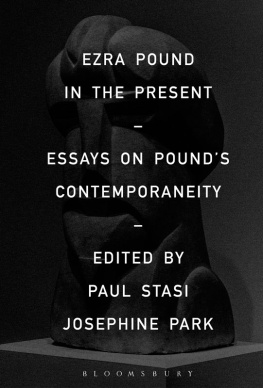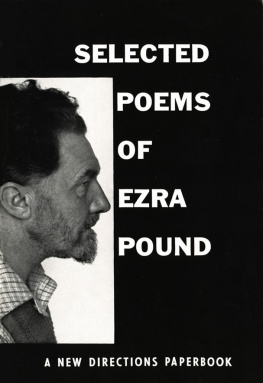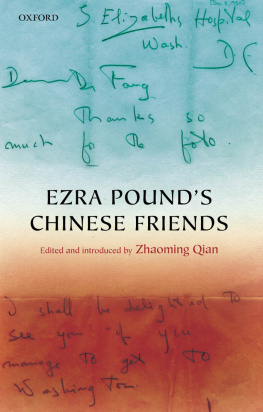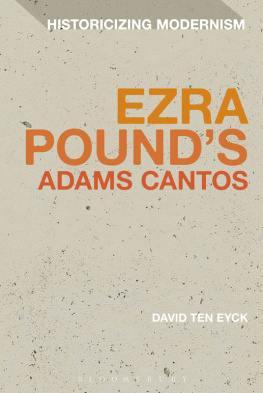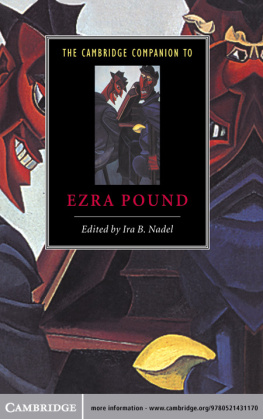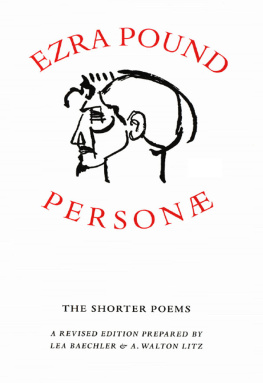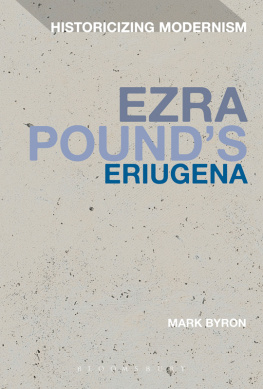Park Josephine Nock-Hee - Ezra Pound in the present: essays on Pounds contemporaneity
Here you can read online Park Josephine Nock-Hee - Ezra Pound in the present: essays on Pounds contemporaneity full text of the book (entire story) in english for free. Download pdf and epub, get meaning, cover and reviews about this ebook. City: New York, year: 2018, publisher: Bloomsbury USA;Bloomsbury Academic, genre: Romance novel. Description of the work, (preface) as well as reviews are available. Best literature library LitArk.com created for fans of good reading and offers a wide selection of genres:
Romance novel
Science fiction
Adventure
Detective
Science
History
Home and family
Prose
Art
Politics
Computer
Non-fiction
Religion
Business
Children
Humor
Choose a favorite category and find really read worthwhile books. Enjoy immersion in the world of imagination, feel the emotions of the characters or learn something new for yourself, make an fascinating discovery.
- Book:Ezra Pound in the present: essays on Pounds contemporaneity
- Author:
- Publisher:Bloomsbury USA;Bloomsbury Academic
- Genre:
- Year:2018
- City:New York
- Rating:5 / 5
- Favourites:Add to favourites
- Your mark:
- 100
- 1
- 2
- 3
- 4
- 5
Ezra Pound in the present: essays on Pounds contemporaneity: summary, description and annotation
We offer to read an annotation, description, summary or preface (depends on what the author of the book "Ezra Pound in the present: essays on Pounds contemporaneity" wrote himself). If you haven't found the necessary information about the book — write in the comments, we will try to find it.
Ezra Pound in the present: essays on Pounds contemporaneity — read online for free the complete book (whole text) full work
Below is the text of the book, divided by pages. System saving the place of the last page read, allows you to conveniently read the book "Ezra Pound in the present: essays on Pounds contemporaneity" online for free, without having to search again every time where you left off. Put a bookmark, and you can go to the page where you finished reading at any time.
Font size:
Interval:
Bookmark:
Ezra Pound in the Present
Ezra Pound in the Present
Essays on Pounds Contemporaneity
Edited by
Paul Stasi and Josephine Park
Bloomsbury Academic
An imprint of Bloomsbury Publishing Inc

The seeds of this book began in 2013, when we each found ourselves teaching The Cantos. Noting the number of Poundian themes that seemed in the airfrom the recognition of the sins of finance capital, to a renewed interest in China, and a fetishized investment in the founding fatherswe found ourselves rethinking many of our assumptions about his work. In light of contemporary events, Pound seemed differentand relevant all over again.
Our half-serious shorthand for the set of questions this raised was Would Pound have joined the Tea Party? Given the strong populist strain in Pounds thinking, with its characteristic combination of progressive and reactionary elements, we could hear his voice in the Tea Partys outrage at the government bailout of the financial industry. He would have appreciated, too, their hatred of taxes and felt at home among their veneration of eighteenth-century American leaders. At the same time, he would have found their anti-intellectualism appalling and, despite his well-documented and famous intolerance, he would have rejected outright the xenophobic nationalism of the American right-wing.
Indeed, Pounds critique of nationalismhis investment in world literatures, distinct from the category of world literature as it is currently understoodremains one of his most compelling intellectual efforts. Writing at the time of an emergent globalization that has fully bloomed in the contemporary world, Pound attempted to find a polyglot poetic form adequate to that world, without homogenizing its component parts into something like a world culture. That is to say, he required national boundaries and national particularities, even as he worked to transcend them. Perhaps his work could be relevant for our present conversations about comparative literature? And what could Pounds seemingly prescient desire to connect the United States to China have to say about the forms of economic interdependence that have linked these nations in the twenty-first century?
To raise these questions is also to recognize how deeply interconnected Pounds varied lifelong interests were. Economics, aesthetics, governments, and anthologies were all of a piece for Pound; and in a time of widespread financial crisis, when the relationship of all areas of life to the larger economic conditions of the world is harder and harder to ignore, might not Pounds claims about the relationship between art and economics have something interesting to tell us? In short, the world seems to have caught up with Pound, making him seem less and less like the lone voice in the wilderness that was one of his most cherished personae. Rather, his maverick economic and political determinations engage with some of the most important developments of this last century, and his conviction in the force of the work of art seems welcome, mired as we are in the very material conditions he addressed with acts of aesthetic making.
As we mulled all of this over, the idea for the book began to take shape. We generated a list of contemporary interests, some intellectual, some historical (a false distinction if ever there was one). Our goal was to engage both those thinkers who had powerfully shaped our existing sense of Poundand might be willing to rethink some of those ideas in light of the present dayas well as newer scholars whose recent approaches to Pound might animate his relationship to the contemporary. The collection that emerged took our incipient thoughts in new and challenging directions, situating Pound in ways that help us reimagine his work while simultaneously suggesting how that work might help us reimagine our present moment.
The chapters
Divided into three partsPounds Methods, Pounds Worlds, and Pounds Valuesthe chapters in the book all take seriously Pounds idea that artists are the races antennae, a phrase often invoked to valorize the artists prescience (SP 229). What immediately follows it, however, is telling: The effects of social evil show first in the arts (SP 229). These lines resonate in at least two ways with Pounds work. First, and most obviously, they suggest the ways in which a familiar range of twentieth-century social evils made their way into Pounds art. More subtle, however, is the idea of registering that the metaphor of antennae suggests, for Pounds oeuvre provides a record of the contradictions of his moment, many of which persist into the present day. None of the chapters ignores Pounds flaws nor suggests that these flaws should themselves be dismissed. Rather, what unites these chapters is the shared conviction that Pounds efforts to include history inevitably reveal the ways history included him, and that these historical engagements are of a piece with his aesthetic achievements.
In doing so, they cast new light on many of the old chestnuts of Pound criticism. Charles Altieri returns to Pounds image to identify an alternative to the epiphanic lyricism that dominates poetry today. Distinguishing the construction and intensity of Pounds early lyrics from the standard of visual epiphanies and aural refinement installed by his fellow imagistes, the chapter rereads Pound against Vincent Sherrys recent claim for a lingering decadence in modernist verse. Reconsidering the sights and sounds of Pounds imagismin which we do not see pictures but relations, in music that does not make impressions but patternsAltieri reads these works as a movement toward concrete states of mind that establish their own complex realities. These states and realities form the platform for The Cantos, and in marking this through line into Pounds epic, the chapter uncovers the certitudePounds ideogram for truth, a person standing beside his wordby which the private self contributes to public culture. Altieri signals the remarkable conviction of the composing intelligence of Pounds image, whose ability to manifest alternate worlds and independent beings is sorely needed in our present scene of lyric.
If Pounds images establish patterns and relations, they also build the archive of materials to which The Cantos continually turn. Considering this archival structure in relation to what we have come to call big data, Josephine Park queries the resonance of Pounds reading guides with the present digital turn in literary study. Considering Pounds literary data alongside Morettis distant readingboth stunts against the conventional reading practices of the classroomthe chapter identifies a shared desire for ever-larger data sets as modes of capturing ethics, on the one hand, and the elusive history of style, on the other. It is no coincidence that this longing for big data sends both of these literary iconoclasts to China, the ultimate storehouse in the Western imagination. Park reads the onslaught of the China Cantos as the longed-for appearance of pure data in Pounds epic, while Morettis turn to the Chinese novel becomes a refuge away from the close reading he eschews in his accounts of the Western canon and its swaths of lesser works. China is a strangely easy read in both cases, and both forays expose their grounding methodological assumptions. Against Morettis literary history routed through quantitative exploits, however, Pound is a through-and-through media historian; the chapter concludes by positioning Pound within the modern epistemic break of media history, typing out data at once transparent and distant.
Aaron Jaffes chapter also reads Pound as a theorist of media, though here the history is no longer literary but geological. Taking up Pounds notion of the osmosis of persons, which describes the intercourse between humans and things, Jaffe develops a reading of Pound in light of contemporary theories of deep time. Pounds osmotic yield of permanent, classified, or uncorroded value traces a technical drift across semi-permeable membranes, that suggests our constant exposure to invisible agencies and hidden mechanisms of value. Jaffes chapter centers on the Twelfth Canto, often lost between the grandeur of the Malatesta Cantos and the calm of the thirteenth, to show how its simultaneous consideration of aesthetics, Roman architecture, and speculative business endeavors demonstrates the range of inhuman processes that structure our lives.
Next pageFont size:
Interval:
Bookmark:
Similar books «Ezra Pound in the present: essays on Pounds contemporaneity»
Look at similar books to Ezra Pound in the present: essays on Pounds contemporaneity. We have selected literature similar in name and meaning in the hope of providing readers with more options to find new, interesting, not yet read works.
Discussion, reviews of the book Ezra Pound in the present: essays on Pounds contemporaneity and just readers' own opinions. Leave your comments, write what you think about the work, its meaning or the main characters. Specify what exactly you liked and what you didn't like, and why you think so.

